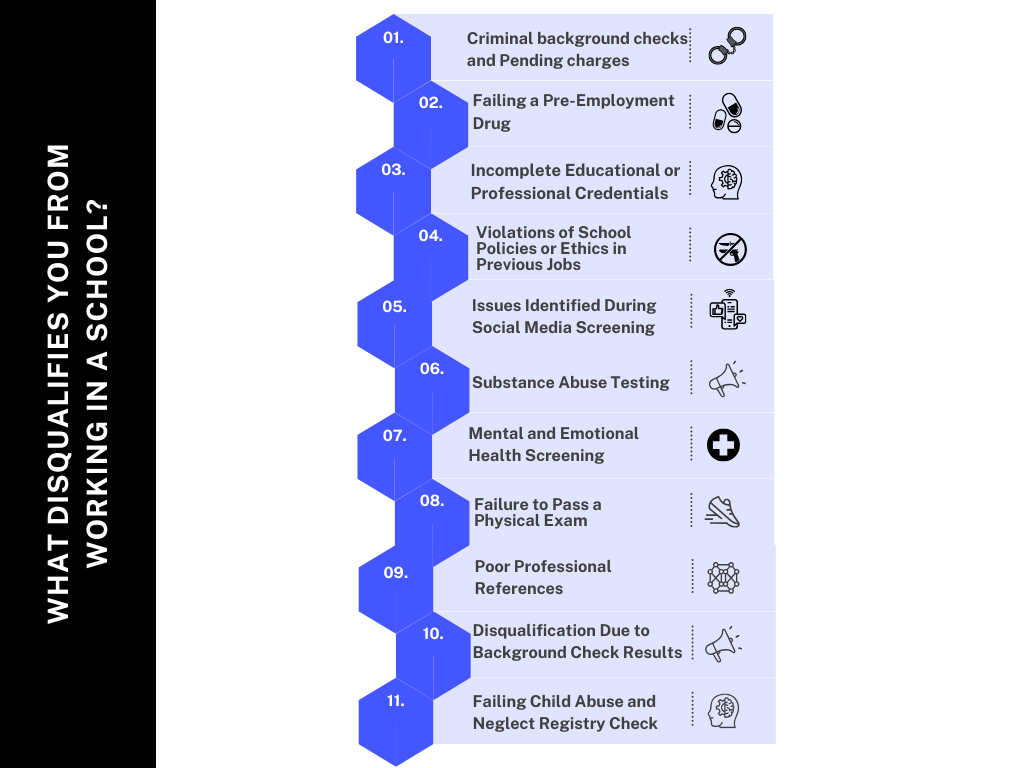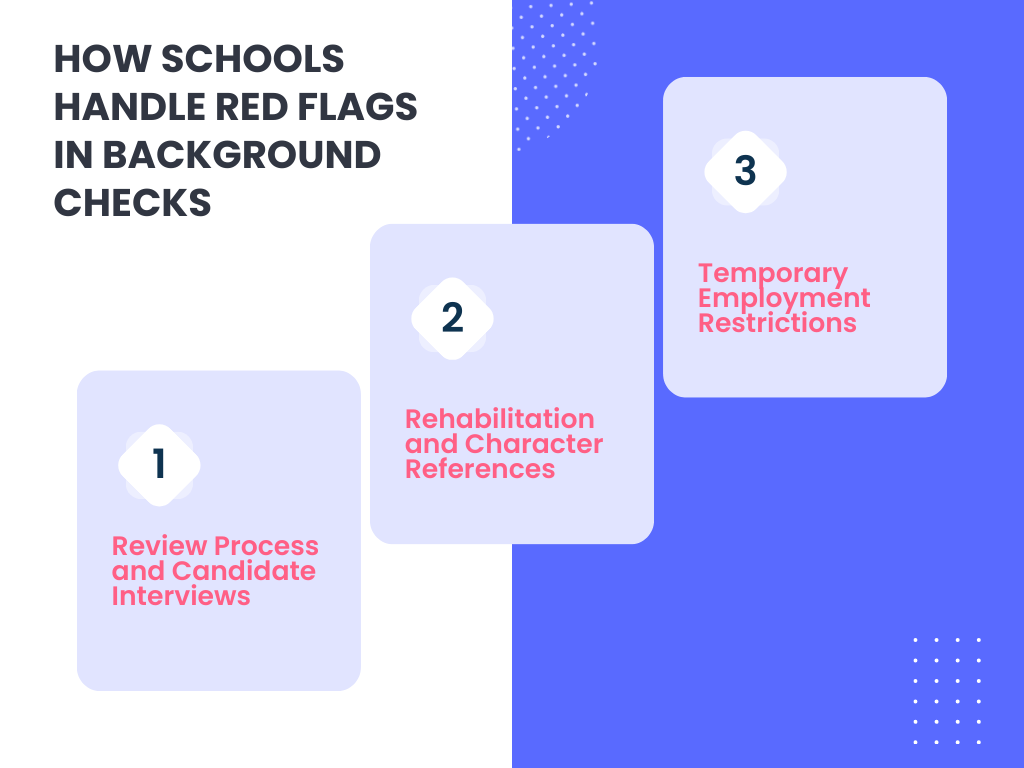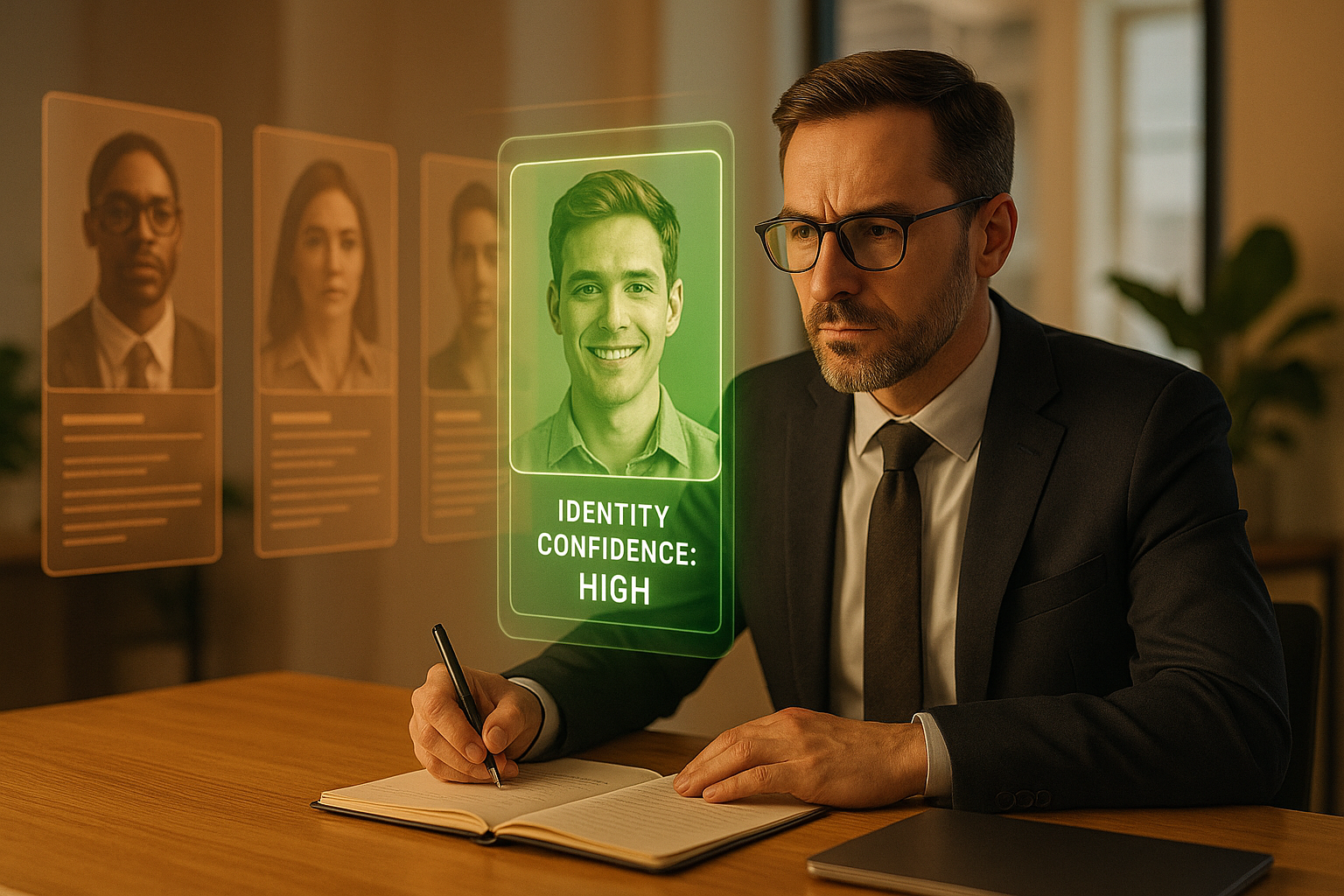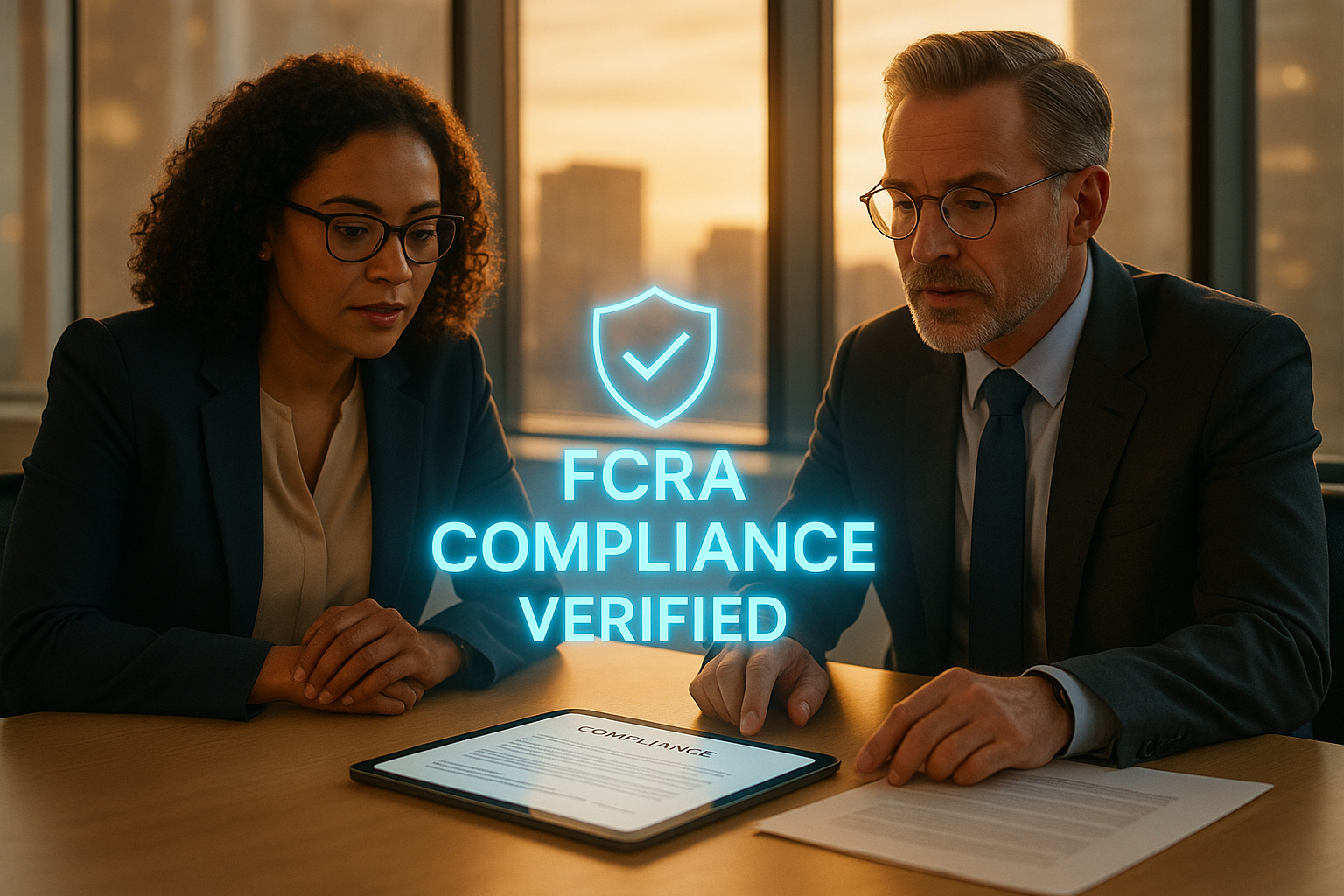¿Qué lo descalifica para trabajar en una escuela?

Working in a school and educational sector requires a high level of trust and responsibility, as it involves directly influencing young lives and ensuring their safety. As a result, schools have strict hiring processes, including comprehensive background checks, to assess a candidate's eligibility for these sensitive roles.
And a background check is a process used by an organization or person to confirm that an individual is who they claim to be, and check their past record to verify education, employment history, and other activities, as well as check for a criminal record. For more on the benefits of AI in background checks, see our article on Background check with AI.
If you're preparing for a role in a school setting, understanding what could disqualify an employee is crucial. Here’s a detailed look at factors that may prevent employees from being hired in a school.

1 - Criminal Background Checks and Pending Charges
Criminal history checks are an important part of teacher and school employee screenings, covering searches at the county, state, or federal level. Schools are particularly vigilant for a history involving violence, sexual abuse, child abuse, or neglect. Certain other crimes, such as drug offenses, may also raise concerns.
- Violent Crimes: Crimes involving physical harm to another person, such as assault or battery, are often disqualifying factors. Schools are especially cautious about hiring individuals with violent histories to ensure the safety of students and staff.
- Sexual Offenses: Crimes that have a sexual component, which can involve physical harm (e.g., sexual assault) or mental and emotional harm (e.g., child exploitation or pornography), are severe disqualifications. Schools prioritize protecting minors, making these offenses an immediate red flag.
- Drug-Related Offenses: Offenses related to the possession, use, or distribution of illegal substances may raise concerns about judgment, safety, and influence on students. Many schools view drug-related offenses as incompatible with their standards.
- Theft and Financial Crimes: Crimes such as theft, fraud, or embezzlement raise concerns about trustworthiness, as schools need to ensure that staff members act ethically with school resources and student records. Financial crimes indicate a risk in environments handling confidential information.
- Serious Felonies: Felonies of a severe nature, like homicide or kidnapping, represent extreme risk factors. Due to the nature of these crimes, individuals with these records are generally not allowed to work in schools.
2 - Failing a Pre-Employment Drug
Test Drug tests is an important part of the hiring process in schools to ensure the safety of both students and staff. If a candidate fails a drug test, they may not be hired, for positions that include direct interaction with students.
3 - Incomplete Educational or Professional Credentials
Schools require candidates to have certain degrees or certifications that are related to their roles. Not having the necessary educational or professional qualifications can lead to disqualification. rephrase
4 - Violations of School Policies or Ethics in Previous Jobs
Any previous violations of rules or ethical standards at other schools, such as misconduct behavior, can result in disqualification. Schools prefer candidates who have demonstrated a history of responsibility and professionalism.
5 - Issues Identified During Social Media Screening
Social Media Background Screening can reveal concerning behaviors, attitudes, or posts that could be inappropriate for a school setting. Schools look for professionalism and responsible online behavior.
- Privacy Settings and Employer Access: Keeping privacy settings updated is essential for ensuring that only appropriate content is visible to the public, including potential employers.
- Managing Your Professional Image Online: A professional online presence can reassure schools that you maintain a respectful and responsible public persona.
- Avoiding Controversial or Sensitive Content: Schools prioritize candidates who exhibit discretion and avoid posting or sharing content that could be seen as divisive, offensive, or harmful.
For more, check out our article on the Importance of social media screening.
6 - Substance Abuse Testing
Schools may conduct substance abuse testing to ensure that employees do not misuse substances, which could endanger students or create an unsafe environment. And reduce hiring bias by using advanced tools to provide fair assessments.
7 - Mental and Emotional Health Screening
Schools may assess mental and emotional health to ensure employees can manage the demands of working with students. Mental health issues are reviewed on a case-by-case basis and generally aim to support, not exclude, potential employees.
8 - Failure to Pass a Physical Exam
Physical exams may be required for certain roles within schools, such as coaching or physical education teaching. Failing this requirement may result in disqualification, depending on the job's physical demands.
9 - Poor Professional References
Quality references from previous employers are essential. References that indicate a history of unreliable or unprofessional behavior could disqualify someone from a school job.
10 - Disqualification Due to Background Check Results
Schools review background check findings. While minor offenses may not lead to disqualification, more severe findings, such as violent or sexual offenses, will likely do so.
11 - Failing Child Abuse and Neglect Registry Check
All school employees are required to pass a child abuse and neglect registry check. If a candidate is listed in such a registry, they will not be eligible to work in a school.
Why Background Checks Are Important in Schools
Background checks in schools are important for creating a secure learning environment. Since 70% of job applicants have lied or would consider lying on their resumes, careful screening helps to prevent false information. Learn more about why this statistic matters by reading 70% of job applicants have lied.
- Protecting Student Safety: The primary reason for background checks is to safeguard students from potential harm by identifying any risks in a candidate’s history.
- Building a Trustworthy and Professional Staff: By thoroughly screening all school employees, schools ensure a reliable and qualified team dedicated to a safe and constructive learning atmosphere.
- Preventing Misconduct and Unethical Behavior: Background checks can help identify past occurrences of misconduct or unethical behavior, reducing the chances of similar actions happening within the school.
- Compliance with Legal and Regulatory Requirements: Schools must follow specific state and federal guidelines to ensure they are hiring within legal parameters and protecting all stakeholders involved.
- Improving Community Confidence: Knowing that the school performs thorough background checks reassures parents, guardians, and the community that the school prioritizes safety and professionalism.
- Screening for Roles Beyond Teaching: Background checks are performed not only for teachers but also for other positions in the school, such as office staff, coaches, and volunteers who work with students.
- Encouraging a Positive School Culture: When all staff members follow to high standards of conduct, it helps create a respectful and supportive atmosphere for students.
- Screening for Patterns of Behavior: Background checks provide schools with information about past actions of candidates, allowing them to determine if an applicant aligns with their values and expectations.
Legal Protections for Applicants: Fair Hiring Practices and Rights
Applicants for school jobs have important rights during background checks to ensure they are treated fairly. Schools must follow certain legal regulations to protect applicants and guarantee a just hiring process. Here are the key protections:
- Fair Credit Reporting Act (FCRA): The FCRA governs the process of conducting background checks. It guarantees that the information collected is accurate and that applicants are informed if a background check will influence hiring decisions. Schools must obtain the applicant's consent before performing a check and must notify them if their application is denied based on the findings. For more information, refer to our article on the Fair Credit Reporting Act (FCRA).
- Ban the Box Laws: States and local jurisdictions have implemented Ban the Box laws, which stop employers from inquiring about criminal records at the beginning of the hiring process. This gives applicants the opportunity to be evaluated based on their skills and experience before their criminal history is taken into account.
- Rehabilitation and Disqualification Appeals: If an applicant is disqualified from a school position because of previous offenses, they may have the option to appeal the decision or show proof of their rehabilitation.
These legal protections ensure that applicants are treated fairly and not unfairly discriminated against based on their past records. Schools must adhere to these guidelines to maintain fairness in their hiring practices.
How Schools Handle Red Flags in Background Checks

Schools have procedures for handling issues identified in background checks:
- Review Process and Candidate Interviews: After identifying red flags in a background check, schools often conduct a thorough review process. This may include collecting more information or inviting the candidate to explain the findings during an interview. During this meeting, the school can ask for clarification, hear the candidate’s side of the story, and determine whether the concern is a minor issue or something that would disqualify them from working in the school.
- Rehabilitation and Character References: Schools may take into account the rehabilitation efforts of candidates with past mistakes. If a candidate has shown a commitment to change—like completing engaging in community service—this can be beneficial to their application. Schools appreciate character references from former employers, mentors, or community leaders who can attest to the candidate’s personal growth, current conduct, and overall fitness for the position.
- Temporary Employment Restrictions: Schools may decide to offer temporary employment while further reviewing the background of candidate. This can be especially common for individuals with minor offenses that don’t pose an immediate threat but require further assessment. Temporary employment restrictions could include working under supervision or in limited roles until the candidate’s qualifications are fully verified.
For more on how AI can streamline background checks, visit our article on Background check with AI. You can also Solicita una demostración para saber cómo las herramientas de IA de Ferretly pueden ayudarte en tu proceso de contratación.
¿Cómo ayudará ferozmente al sector educativo en la verificación de antecedentes?
Mejora ferretly la verificación de antecedentes en el sector educativo mediante el uso de la detección basada en inteligencia artificial para agilizar el proceso y proporcionar análisis de datos. Ferretly permite a los administradores escolares evaluar rápidamente a los candidatos, mientras que los informes personalizables garantizan que reciban información relacionada y adaptada a sus necesidades.
Ferretly ofrece un monitoreo en tiempo real de los empleados, lo que ayuda a las escuelas a cumplir con las normas legales y monitorear el riesgo continuo. Al automatizar y simplificar las verificaciones de antecedentes, Ferretly permite a las escuelas contratar de manera segura y eficiente, garantizando que todas las personas que interactúan con los estudiantes sean investigadas.
Preguntas frecuentes
1 - ¿Qué es la verificación de antecedentes de un maestro?
Las verificaciones de antecedentes de los maestros verifican la identidad, los antecedentes penales y el historial laboral o educativo, garantizando que los candidatos cumplan con los estándares de seguridad para trabajar en las escuelas.
2 - ¿Qué busca una verificación de antecedentes escolares?
Las verificaciones de antecedentes escolares generalmente examinan los antecedentes penales y las credenciales profesionales del candidato y pueden incluir pruebas de drogas, exámenes en las redes sociales y otras evaluaciones de seguridad.
3 - ¿Las escuelas verifican los antecedentes?
La mayoría de las universidades verifican los antecedentes de los futuros estudiantes; sin embargo, no todos los solicitantes son rechazados automáticamente. Los estudios muestran que el 66,4% de las universidades recopilan antecedentes penales información sobre al menos algunos solicitantes.
4 - ¿Las escuelas verifican los antecedentes de los padres y los estudiantes?
El padre promedio no está obligado a someterse a una verificación de antecedentes escolares, excepto para voluntarios como tutores, acompañantes, entrenadores deportivos juveniles o ayudantes de aula.
5 - ¿Las escuelas contratan delincuentes?
Es posible que algunos delitos no impidan que alguien consiga un trabajo, pero condenas por delitos sexuales, delitos violentos, delitos relacionados con drogas específicas, abuso infantil y otros delitos graves por lo general, descalifican a una persona para trabajar en las escuelas.
6 - ¿Cuánto dura una verificación de antecedentes escolares?
El tiempo que lleva completar una verificación de antecedentes puede variar, pero muchas escuelas intentan terminarlos en el plazo de una semana para acelerar la contratación.
7 - ¿Puedo convertirme en profesor con antecedentes penales?
Es posible convertirse en profesor con antecedentes penales, según el tipo de delito y las leyes locales, pero cada situación se analiza de forma individual.






